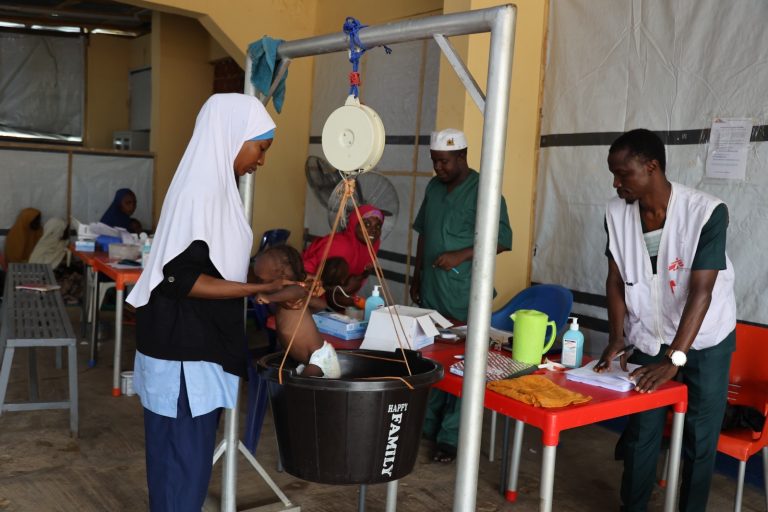Médecins Sans Frontières (MSF), also known as Doctors Without Borders, is making a significant impact in Bauchi State by providing free medical services to approximately 2,000 children aged between one month and 15 years every month.
The humanitarian organization is supporting the Bauchi State Government in addressing malnutrition and vaccine-preventable diseases among children.
MSF’s Project Medical Referent in Bauchi, Dr. Claude Bitaronga shared details of the organization’s work during a media tour to the MSF pediatric hospital in Kafin Madaki, Ganjuwa Local Government Area. The tour was organized by the Journalists for Public Health and Development Initiative (J4PD).
Dr. Bitaronga explained that MSF offers a wide range of services to hundreds of children presenting with severe acute malnutrition and other complications.
“Patients arriving at this hospital are often referred from Primary Health Care Centres across Bauchi, as well as from neighbouring states like Jigawa and Plateau. Others come after hearing about the free services we offer,” he said.
He noted that the hospital receives between 70 and 80 patients daily during regular periods and up to 100 patients during the peak season from April to July.
“Between 2024 and 2025, we have seen a surge in patient numbers during these months, prompting us to expand our bed capacity from 250 to 350 to accommodate the growing demand for care,” he added.
At the MSF isolation center, children and their caregivers receive three free meals daily. The organization also supplies essential items such as medications, sanitary kits, and lab investigations at no cost.
“We also provide Ready-to-Use Therapeutic Food (RUTF) tailored to each child’s age and weight to support recovery. Once stabilized, children are referred to our Ambulatory Therapeutic Feeding (ATF) centers for continued care,” Dr. Bitaronga said.
MSF has also introduced the Para-MUAC strategy, training parents and caregivers to use the Mid-Upper Arm Circumference (MUAC) tape to detect malnutrition early.
“Many parents now arrive with accurate MUAC readings, which aids quicker diagnosis and treatment,” he said.
To strengthen community ties, the hospital runs a health promotion and engagement unit that raises awareness about its services and encourages community participation.
Musa Damsari, a father from Kirfi Local Government Area, shared how MSF’s intervention saved his 18-month-old son after other hospitals failed.
“We had tried traditional herbs, but the care here made all the difference,” he said.
Aisha Mohammed from Ningi LGA said her two-year-old son showed remarkable improvement after nine days of treatment.
“His swelling has reduced by 90%. The free meals, protein-rich foods, and RUTF helped a lot,” she said.
Beyond medical treatment, MSF also provides mental health services to caregivers.
“When a child is malnourished, it affects the entire family—especially the mother. We offer psychosocial support to help them cope,” said Dr. Bitaronga.
Despite the original Memorandum of Understanding (MoU) stating a 50-50 staffing arrangement between MSF and the Bauchi Ministry of Health, MSF currently provides 80% of the doctors. The state supplies 20% of the doctors and the majority of the nursing staff.
As MSF continues its work in Bauchi, it is not only delivering life-saving care but also building long-term capacity in the local health system to secure better health outcomes for future generations.
By Lizzy Carr


